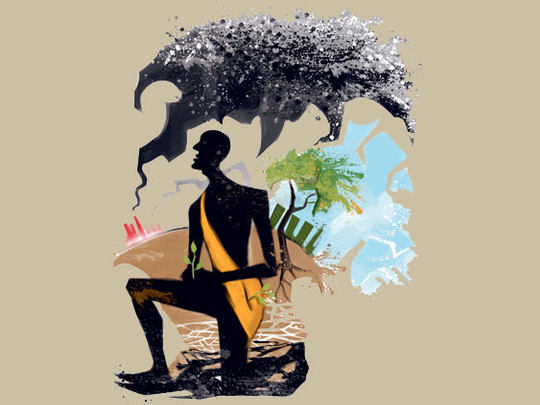
Arguably, the greatest calamities facing humanity at the end of 2011 are global poverty and climate change. So it is perhaps more than appropriate that the United Nations' just-concluded climate-change conference (COP17) took place in Africa — a continent where these two challenges interact the most. Thanks in many ways to a more outward-looking African leadership, the talks in Durban produced a commitment from all parties for a successful and expeditious implementation of last year's Cancun agreements on climate change.
Indeed, 2011 confirmed Africa's emergence as a dynamic source of growth for the global economy. Six of the world's ten fastest-growing economies were in sub-Saharan Africa. And, if IMF [International Monetary Fund] forecasts are correct, Africa will grab seven of the top ten places over the next five years.
Over the past decade, the simple unweighted average of countries' growth rates was virtually identical in Africa and Asia. Over the next five years, Africa is likely to take the lead. In other words, the average African economy is beginning to outpace its Asian counterpart.
Of course, some of this growth is related to high world commodity prices, particularly for oil. But that is not the whole story. Ethiopia has been one of the world's fastest-growing economies for a decade and none of its dynamism is related to oil or energy. Much of the growth in Nigeria, the continent's giant, has also been in non-commodity sectors.
The other great sign of hope in Africa this year — the Arab Spring in North Africa — has not yet shown economic benefits. On the contrary, the region's economies have suffered near-stagnation as a result of the political instability in the early months of 2011. This will almost certainly mean a lower average growth rate for the continent as a whole. But, in any other decade in Africa's history since 1945, such a hit to growth would have pushed the entire continent's economy into the red. That change reflects a positive trend that was confirmed in 2011: greater diversification in Africa's trading partners. China overtook the United States as Africa's number one trading partner in 2009, but now other emerging markets — particularly India, South Korea, Brazil, and Turkey — view Africa as a growth opportunity. Indeed, the share of Africa's trade conducted with emerging-market partners has grown from 23 per cent to 39 per cent over the last decade.
With economic growth, a new confidence and assertion of global responsibility have come to Africa's governments. In Durban, for example, the African presidency of COP17 delivered a set of key decisions in the fight against climate change. Important seeds were planted, including the establishment of the Durban Platform for Enhanced Action, which will help negotiate a new global agreement on climate change by 2015, and possibly earlier.
Promising sign
Of course, the momentum gained in Durban will need to be sustained if we are to curb the growing pace of global warming. But the leadership provided by Africa is a promising sign that the continent is unwilling to be left behind in the formulation and promulgation of new global rules that have an impact on development.
To enhance Africa's role, the African Development Bank has called on developed countries to implement the decisions taken in Durban in a timely fashion. In particular, they should ensure that the Green Climate Fund — established in Cancun in 2010 — operates in a manner that eases and increases low-income countries' access to financing for climate-change adaptation and mitigation efforts.
There is good reason for Africa to assert leadership on climate change: it continues to suffer disproportionately from the effects of global warming. Africa's 54 countries are home to more than a billion people, or around 15 per cent of the world's population. Yet it generates less than 4 per cent of global emissions.
The rest of the world's emissions are taking a heavy toll on Africa, which endures drought, severe weather changes, pollution, agricultural damage, deforestation and desertification. With a large part of its population still heavily dependent on agriculture and fishing for survival, Africa's growth prospects, and thus living standards, are highly vulnerable.
We recognise that developing the Green Climate Fund will require much work, notably on such issues as its governance and how it is to be accessed. But capitalisation and the need for progress on new sources of funds are of paramount importance if climate change is not to become an even more severe impediment to Africa's growth in 2012 and beyond.
We are keen to see improvement over the Fund's existing instruments, which did not fully take into account adaptation as a priority for Africa, the complex procedures for implementation and criteria for access.
Without sustained action to finance the fight against climate change, we risk compromising Africa's gains over the last ten years. Africa is now the nexus of many of the world's problems, but also of its hopes. Fortunately, as the people of North Africa have demonstrated, the continent's citizens are ready to create a better future for themselves.
— Project Syndicate, 2011
Donald Kaberuku is president of the African Development Bank.











